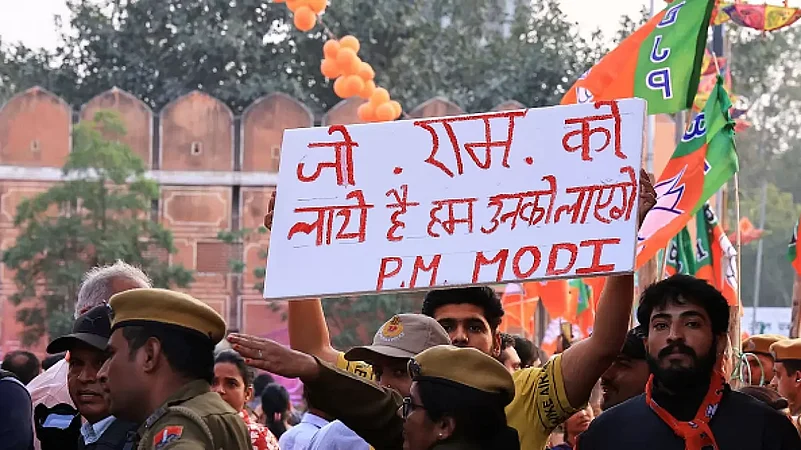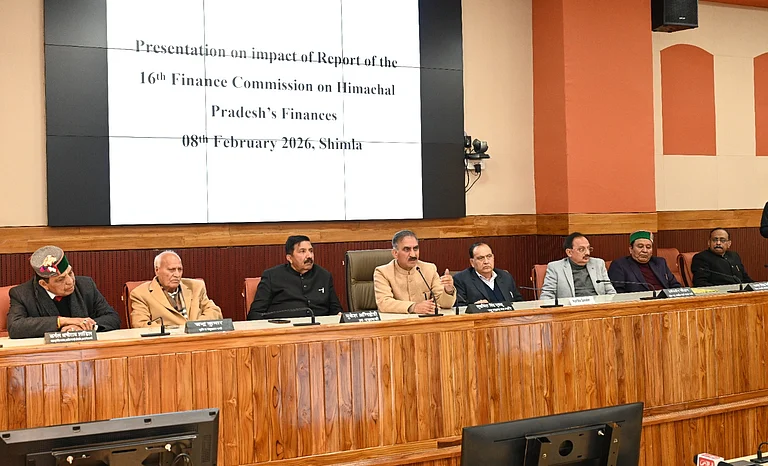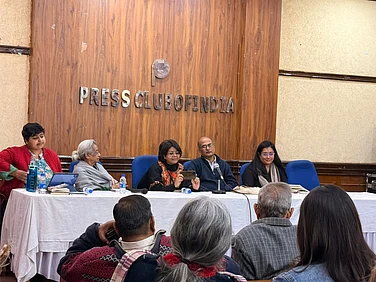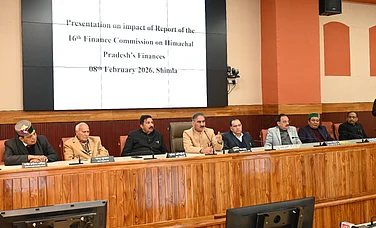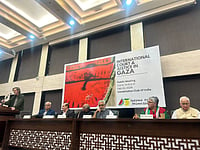In Rajasthan's Tonk, which is often locally dubbed as 'Lucknow of Rajasthan', 'Land of Nawabs', given its sizable population of the Muslim community, the election campaign has been seen a tilt towards communal politics. BJP's Delhi MP Ramesh Bidhuri, who recently courted controversy over his derogatory, communally polarising remarks in Parliament against BSP MP Danish Ali, said that Lahore is keeping an eye on the elections of Tonk and Rajasthan. Bhiduri, who has been made in charge of the BJP in the poll-bound state, was addressing a youth workers' meeting organised by the BJP candidate in Tonk Ajit Mehta. He said, "We will have to see whether laddus will be distributed in the country or in Lahore after the elections on the 25. The enemy sitting outside the country is keeping an eye on this election. It is a question of our identity.”
With a day left for polling in Rajasthan and a week for its counting, it’s time to look back and understand how the two key, political contenders of the state have fared well with their campaigns. While Congress has largely banked on its welfare schemes to woo voters, BJP has sliced through the gaps -- rising crime against women, unemployment, anti-incumbency, and necessarily communalism.As November 25 got close by, the political discourse of Rajasthan seemed to have drifted towards the politics of religion. While addressing an election rally in the Baytoo constituency, Prime Minister Narendra Modi said, “Slogans supporting terrorism are being hailed in Rajasthan and this was beyond expectation. It is Congress’s appeasement politics that nurtures communal violence and terrorism wherever the party goes.” Hitting out at the Ashok Gehlot-led state government, he said that the Congress is leading the state towards ‘cultural disintegration’ and as a result, it’s the economically weaker section that has to face the brunt of communal disharmony.Ever since the onset of the election hawa in the state, the opposition, BJP has harped on gods and goddesses while roping in the grandiose of the Ram temple to woo the voters in another state. Needless to say, it has left no stone unturned to make the Kanhaia Lal murder case a central talking point to deepen religious politics.On June 28, last year, Kanhaiya Lal, a 48-year-old tailor in Udaipur was killed with a cleaver inside his shop by people of the Muslim community to avenge the alleged insult to Islam during the ongoing row over Prophet Muhammad triggered by a comment made by a former BJP person. Following Lal’s death, BJP National President JP Nadda claimed that those who raised slogans like 'sar tan se juda' (threatening beheading) were being encouraged by the ruling Congress government. Referring to this incident, Modi during one of his rallies, said, “Could we even imagine that in India we would ever hear a slogan like 'sar tan se juda' (a reference to beheading)? But this has happened in the land of braves under the misrule of the Congress.”In a counterattack, CM Ashok Gehlot claimed that the men responsible for the murder of Lal were from BJP and they were later freed, irking anger among people against the Congress government. Hitting at the BJP, Gehlot has reiterated that the saffron’s party ‘divisive politics’ might work in Uttar Pradesh, but in Rajasthan people ‘preferred staying in peace’.Muslims sway towards Congress
In the capital city of Jaipur, Moeen, 18, a young Muslim boy hugs a poster of Gehlot and runs from places. He says, “Congress meri jaan hai, sabka bhala karta hai (Congress is my life, does goo for all).”
In Rajasthan, the vote bank of the minority community has largely maintained its loyalty towards the Congress and such instances are visible in places like the Sheo constituency, in Barmer where despite an acute water crisis and a hindered development of infrastructure, it has been the incumbent 85-year-old Ameen Khan, who has been winning the seat on Congress ticket. Barmer has a sizable population of Muslims and a similar situation is also seen in the Sardarpura constituency of Jodhpur where Muslims make up the largest votebank of around 28,000. Speaking to Outlook, Mohamadden Hanef Khilji, 83, says, “We will benefit only from the Congress rule. Gehlot ji does not want to set a community on fire like the BJP. Congress never did so and can never do so.” Khilji, who had to witness the horrific ripple effect of the Babri Masjid demolition of 1992 says that she is yet to revive from the fear his community went through back then and his anger has never let him forget what ‘ills have befallen Muslims since then’. Referring to the saffron party, he says, “Puri desh mein inhone toh lagayi aag.”Along with Khilji, voters from the Saradrapura area believe that although there are riots that may break out in Rajasthan, under the Congress rule, they are lesser in numbers. Deepak Mangani, Sindhi, says that although Congress preaches appeasement politics, however, “danga is less”.As one moves from the west to the east, in Alwar (urban), Muslims appear to be swaying towards the Congress; perhaps in a collective bid to resist the BJP’s Hindutva politics. Mubarik Khan Malik, 24, tells how the BJP’s sadhu-sant (seers and saints) politics in the region only polarise one community. “They have not even won the election, and they have already started speaking about bulldozer politics,” says Malik referring to recent speeches by Uttar Pradesh Chief Minister Yogi Adityanath and Mahant Balaknath, BJP’s contestant from the Tijara seat in Alwar, which has frequently made headlines for communal violence.BJP’s Hindu consolidation and AIMIM’s inroads
Moving southwest to Tonk, which has been historically considered a 'minority seat' of the Congress given the dominance of the Muslim population, Bhiduri made yet another contentious statement. After his Lahore remark, he further alleged, "The whole country is eagerly watching this election. Not just the country, Lahore is keeping an eye on elections in Rajasthan and Tonk. Who gives shelter to PFI people? When PFI people are caught, who provides them with food? People sitting in Tonk feed them.”Bhiduri didn’t only refer to the banned radical Islamic outfit Popular Front of India, he also roped in Hamas in his derogatory remark. In a purported video of Bhiduri’s speech from that night, he can be heard saying that ‘terrorists like Hamas have an eye on this region’. “If someone dies in an accident, his family is given a job and ₹ 50 lakh... and if an innocent Kanhaiya is murdered, then there is talk of giving ₹ 5 lakh as alms," he reportedly says.The BJP has not extended a ticket to any Muslim candidate in this assembly election while Congress has fielded 15 candidates. But the question lies in whether it could be a split vote with the entry of the AIMIM which has fielded candidates for around 13 seats. The AIMIM has been trying to make inroads in Tonk which might cut into the Congress’s Muslim vote. Earlier this year, AIMIM chief Asaduddin Owaisi held a rally in Tonk district, where he urged the community to consolidate its “political power” if it wanted to have its “injustices and pain addressed”.Tribals baulk at religious politicsHowever, all the divisive and appeasement politics of both parties tend to take a backseat when one enters the tribal belt of southern Rajasthan. The tribal-dominated electoral belt comprises Banswara, Dungarpur, Pratapgarh and five other districts: Udaipur, Rajsamand, Chittorgarh, Sirohi and Pali, which have significant tribal votes. And the fresh infusion and upsurge of tribal leadership, the Bharat Adivasi Party (BAP), is now emerging as a force to potentially baulk at the ‘religious politics’ of Hindutva organisations, mostly affiliated with the BJP and RSS.
“The BJP has gained traction among adivasi communities in recent years. It is evident in their electoral successes. The BJP strategically portrays adivasis as an integral part of the broader Hindutva umbrella, while some Congress leaders advocate recognising their distinct religious identity. The rise of BAP and Bharatiya Tribal Party (BTP) highlights the concerns of adivasis who have historically faced discrimination, exploitation and marginalisation despite electoral promises from both the BJP and Congress,” Kunal Shahdeo, a researcher on Adivasi politics opine.Kantilal Roat, BAP’s MLA candidate from Dungarpur tells Outlook that with the alternate governments of the BJP and the Congress, there has been a constant attempt to divide the state’s adivasis into religious lines: yena, kena, prakāreņa (in whatever manner possible). “Currently, tribals in Rajasthan face two major challenges: religious politics and the dirty blame game of the two parties. The day these (things) stop, perhaps the leaders above would realise the true nature of the demands of adivasis. And trust me, it’s beyond what they think,” claims Roat, who insists that both the BJP and the Congress are alike. “The former practises religious politics openly, while the latter is subtle about it.”






